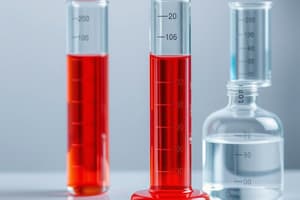Podcast
Questions and Answers
Which unit of concentration is the most commonly used in chemistry?
Which unit of concentration is the most commonly used in chemistry?
- Normality
- Mass percent
- Molarity (correct)
- Molality
What is the purpose of knowing the concentration of solutes in solution reactions?
What is the purpose of knowing the concentration of solutes in solution reactions?
- To increase the pH of the solution
- To decrease the boiling point of the solution
- To determine the color of the solution
- To control the stoichiometry of reactants (correct)
How is the concentration of a solution defined in chemistry?
How is the concentration of a solution defined in chemistry?
- The color of the solute in a solution
- The boiling point of the solute in a solution
- The temperature of the solvent in a solution
- The quantity of a solute in a particular quantity of solvent or solution (correct)
What happens if too much solute is added to a solution?
What happens if too much solute is added to a solution?
What happens if too little solute is added to a solution?
What happens if too little solute is added to a solution?
Flashcards are hidden until you start studying
Study Notes
Concentration Units in Chemistry
- The most commonly used unit of concentration in chemistry is Molarity (M), which is defined as the number of moles of solute per liter of solution (mol/L).
Importance of Concentration in Solution Reactions
- Knowing the concentration of solutes in solution reactions is crucial as it affects the rates of chemical reactions, the direction of equilibrium, and the yield of products.
Defining Concentration in Chemistry
- Concentration of a solution is defined as the amount of solute present in a given amount of solution, usually expressed in terms of mass per unit volume (e.g., grams per liter) or amount of substance per unit volume (e.g., moles per liter).
Effects of Excess Solute
- If too much solute is added to a solution, it may not dissolve completely, resulting in a saturated solution, and eventually, the excess solute will precipitate out of the solution.
Effects of Insufficient Solute
- If too little solute is added to a solution, it will not be concentrated enough, and the reaction may not proceed as expected, potentially leading to incomplete reactions or inefficient use of reactants.
Studying That Suits You
Use AI to generate personalized quizzes and flashcards to suit your learning preferences.



